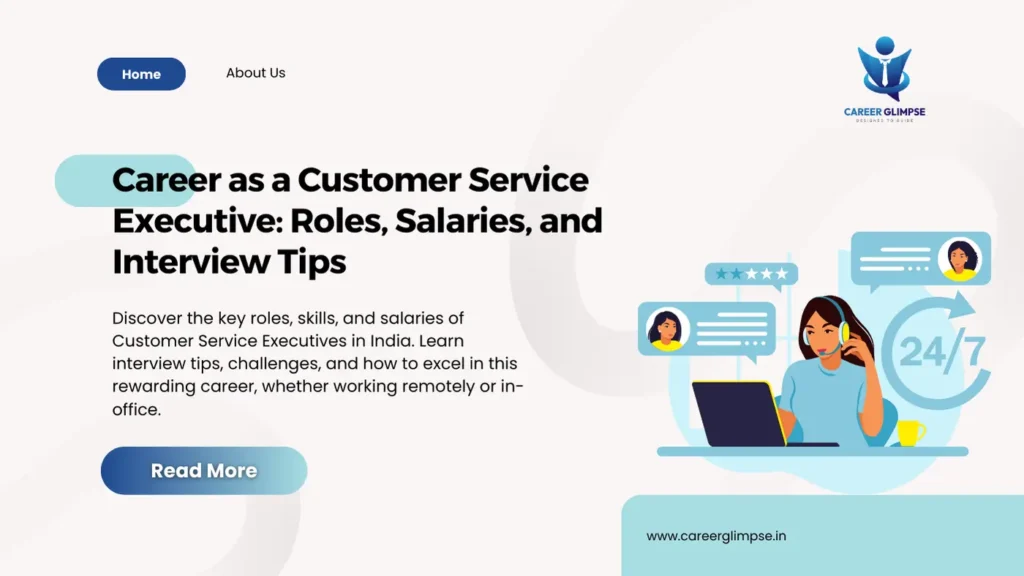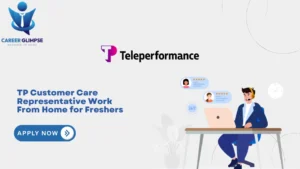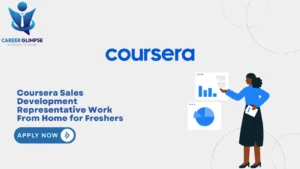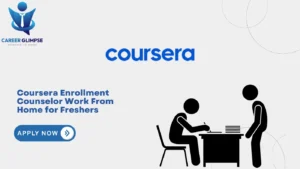Customer service executives play a vital role in companies by acting as a bridge between businesses and their customers. They help build and maintain strong relationships with clients, making them an essential part of any organization. Understanding this career better can help you decide if it’s the right path for you. In this article, we’ll explore what customer service executives do, their key roles and responsibilities, and some common interview questions for this field.
Who Is a Customer Service Executive?
A customer service executive is a professional responsible for effectively communicating an organization’s service expectations. Their primary duties include answering phone calls, addressing customer inquiries, and resolving any issues customers might face. They are the first point of contact for customers, significantly influencing the overall customer experience.
In some cases, customer service executives also manage a team of customer support staff, training them to handle complaints and ensure high-quality service. Many customer service roles are available for freshers, spanning industries like call centers, technology, hospitality, education, and finance.
Top 30 Customer Service Executive Interview Questions and Sample Answers:
1. How would you define good customer service?
Good customer service means understanding the customer’s needs and providing quick, efficient, and helpful solutions. It’s about being polite, empathetic, and ensuring the customer feels valued. Great customer service also focuses on leaving a positive impression, so the customer trusts the brand and wants to return.
2. Why do you want to join this job?
I enjoy interacting with people and solving their problems, which is why I feel customer service is a good fit for me. I like helping customers and making their experience smooth and enjoyable. Also, this job will allow me to develop my communication and problem-solving skills further while contributing to the company’s growth.
3. Describe a challenging problem you recently solved at work. How did you handle it?
In my previous role, a customer was upset because their order was delayed due to a system issue. I calmly listened to their concerns, apologized for the inconvenience, and reassured them that I would resolve the matter. I coordinated with the logistics team to speed up the delivery and provided the customer with regular updates. In the end, the customer was satisfied with the solution and even appreciated the follow-up.
4. How do you approach and resolve work-related issues?
I always try to stay calm and focused when dealing with issues. First, I identify the root cause by gathering all the necessary information. Then, I explore possible solutions and pick the one that works best for everyone involved. If I’m unsure, I don’t hesitate to seek help from my colleagues or manager to ensure the issue is resolved quickly and effectively.
5. How do you organize your daily and weekly tasks?
I prioritize my tasks based on deadlines and importance. I make a to-do list every morning, focusing on urgent issues first. For weekly goals, I plan ahead and break them into smaller steps. Staying organized helps me ensure that nothing is missed and that I manage my time efficiently throughout the week.
6. As a team leader, how do you manage your time and team goals?
I believe in setting clear priorities for myself and the team. I assign tasks based on individual strengths and ensure everyone understands their responsibilities. Regular check-ins and open communication help us stay on track. I also plan my own time so I can assist the team whenever needed, without delaying my own work.
7. Have you used customer feedback to improve business performance? If yes, how?
Yes, in my previous role, I noticed a pattern in customer complaints about delayed responses to their inquiries. I shared this feedback with my manager, and we decided to implement a system to track customer queries more efficiently. This reduced response times significantly and improved overall customer satisfaction.
8. What is your biggest achievement?
My biggest achievement was helping my team reduce customer complaints by 20% in six months. I did this by creating a guide to handle common issues, which helped us resolve problems faster. Seeing the positive impact of my efforts on both the team and customer experience was very rewarding.
9. Explain about a difficult obstacle you had resolved recently at work. How did you solve that issue?
In my previous role, we faced a system outage during peak hours, which disrupted customer service operations. Customers were frustrated due to delays in assistance. I quickly coordinated with the IT team to get updates on the resolution timeline. Meanwhile, I communicated transparently with customers, apologizing and providing temporary solutions where possible. My proactive communication calmed the customers, and we resolved the issue without losing their trust.
10. What are your approaches to promoting great customer service?
I believe in leading by example. I train my team to listen actively, respond empathetically, and focus on first-call resolutions. I also ensure my team understands the company’s products/services thoroughly so they can assist customers confidently. Regular feedback sessions and celebrating customer compliments help keep morale high.
11. What are the major aspects which make a successful call center?
A successful call center depends on:
- Well-trained agents who can handle queries effectively.
- Technology and tools that simplify processes and reduce response times.
- Strong communication within the team to address challenges quickly.
- Customer-centric policies that focus on satisfaction.
- Measurable KPIs to track performance and continuously improve.
12. How do you make sure that your department’s goals are in line with the goals of your company?
I align our team’s KPIs with the company’s objectives, such as improving customer satisfaction or increasing retention rates. Regular meetings with leadership help us stay updated on company priorities. I also share these goals with my team, so they understand how their work contributes to the bigger picture.
13. How do you measure the success of you and your team over a 3, 6, and 12 months period?
- 3 months: Focus on quick wins like reducing response time or improving first-call resolution rates.
- 6 months: Track trends in customer satisfaction scores, retention rates, and team productivity.
- 12 months: Evaluate long-term impacts, such as overall customer loyalty, team performance consistency, and contribution to company revenue or growth.
14. How creative are you as compared to your teammates?
I always try to bring fresh ideas to the table, such as suggesting personalized email responses to recurring issues or implementing a rewards program for loyal customers. I also encourage brainstorming sessions within the team to foster a creative environment.
15. How have you used consumer complaints for improving how your team is selling?
I analyze complaint patterns to identify gaps in our product knowledge or service. For example, when customers raised concerns about unclear billing, I trained my team to explain charges more effectively during calls, which improved customer trust and increased upselling opportunities.
16. Explain your experience of the whole end-to-end feedback process. How do you ensure this feedback improves the services to customers?
I collect feedback through surveys and call evaluations. After analyzing the data, I categorize it into actionable areas, such as product issues or service quality. I then work with the team to implement changes and follow up with customers to ensure the changes meet their expectations.
17. How did you train your front-line agents to ensure excellent customer feedback?
I focus on role-playing exercises, scenario-based training, and real-time call monitoring. I emphasize soft skills like empathy, active listening, and patience, along with product knowledge. Regular feedback and coaching ensure continuous improvement.
18. What has been the most difficult work difficulty you have experienced in the last 12 months?
A significant challenge was dealing with a high employee turnover rate, which affected team productivity. To address this, I introduced mentorship programs and flexible scheduling options, which helped improve morale and retention.
19. Give me an example of a moment when you had to deal with a poor performer on your team.
One of my team members struggled with meeting daily targets. I held one-on-one sessions to understand their challenges and provided additional training. I also set achievable short-term goals and encouraged them with positive feedback. Over time, their performance improved significantly.
20. Role-play scenario: Handling an escalated call with an unhappy customer.
Customer: “I’ve been waiting for a refund for weeks! This is unacceptable.”
Me: “I’m so sorry for the inconvenience caused, [Customer’s Name]. Let me quickly check your refund status and see what happened. Can I have your order ID, please?” (After verifying the issue) “I see the delay, and I completely understand your frustration. I will escalate this to the concerned department and ensure it is processed immediately. I’ll also follow up with you personally to keep you updated.”
21. Give an example of when something happened at work that made you lose your excitement. How did you keep yourself and your team motivated?
When a major project I worked on was canceled due to budget cuts, it was disheartening. To stay motivated, I focused on smaller wins and encouraged my team to do the same. I reminded them of our contributions to the company’s success and ensured we had fun team-building activities to boost morale.
22. What do you know about us and your job role?
I know your company values customer satisfaction and innovation. As a Customer Service Executive, my role will be to ensure seamless communication with customers, resolve their issues, and contribute to building long-term relationships, aligning with your company’s goals.
23. Discuss your current position and why you are interested in working for the company.
Currently, I’m a Customer Support Associate, and I’ve gained solid experience in handling customer queries and complaints. I’m interested in working for your company because of your reputation for excellent customer service and opportunities for growth.
24. If you are recruited into the organization, what do you think your major challenge would be as a team leader?
A potential challenge could be understanding the existing processes and team dynamics. However, I am confident in my ability to adapt quickly by observing, learning, and communicating effectively with the team.
25. How to deal with difficult or angry customers?
I stay calm and listen carefully to their concerns without interrupting. I empathize with their frustration and assure them that I’ll do everything possible to resolve the issue. By maintaining a polite and helpful attitude, I aim to turn a negative experience into a positive one.
26. How have you used technology and process re-engineering to bring business change?
I implemented a CRM system to track customer interactions more efficiently and reduce response times. I also redesigned call scripts to make conversations more customer-friendly, which improved satisfaction scores.
27. Tell me about a time you analyzed complex data to improve service performance.
I reviewed call logs and customer surveys to identify peak times for inquiries. Based on this analysis, I adjusted staffing schedules, reducing wait times by 30%.
28. What are your current targets and KPIs, and how do you plan to meet them?
My targets include improving first-call resolution and reducing average handling time. I plan to achieve these by training the team, monitoring call quality, and using automation tools for repetitive tasks.
29. What are the main qualities of a Customer Service Executive?
Key qualities include patience, strong communication skills, empathy, problem-solving abilities, and adaptability. A good customer service executive should also be a team player and detail-oriented.
30. How would you define good customer service?
Good customer service means listening to customers, understanding their needs, and providing timely and effective solutions. It’s about creating a positive experience that builds trust and loyalty.
Remote Customer Service Executive Interview Questions and Answers
For Representatives/Agents Working from Home
1. How can you ensure that your remote setup is a good working environment?
I make sure my workspace is distraction-free, with good lighting and an ergonomic desk setup. I use noise-canceling headphones for calls and ensure my internet connection is reliable to handle any work-related tasks smoothly.
2. Tell me about your favorite job.
My favorite job was when I worked as a customer support representative for a tech company. I enjoyed solving complex customer issues and learning about innovative tools that improved the customer experience.
3. Do you prefer a flexible job or a structured schedule? Why?
I prefer a mix of both. A structured schedule ensures consistency and productivity, while flexibility allows me to adapt to urgent tasks and maintain a healthy work-life balance.
4. How can you stay motivated while working from home?
I stay motivated by maintaining a routine, setting daily goals, and taking short breaks to recharge. Positive feedback from customers and colleagues also keeps me motivated to deliver my best.
5. What are the challenges you have faced in this domain so far?
One challenge was building rapport with customers over remote communication channels, as body language and tone are harder to interpret. I overcame this by focusing on clear communication and empathy.
Behavioral-Based Interview Questions for Customer Service Executive
1. Describe a moment when you were able to successfully upsell a customer on a new product or service.
While assisting a customer with troubleshooting, I identified that an upgraded version of their software would better suit their needs. I explained the benefits clearly and showed them how it would solve their problems. They appreciated the suggestion and purchased the upgrade.
2. Tell me about a time when you were speaking with a customer who had already spoken with several representatives but was unable to receive the assistance they required. What was the consequence of your handling of this situation?
A frustrated customer contacted me after being transferred multiple times. I carefully listened to their issue and assured them I would take full ownership. I resolved their issue by escalating it to the correct team and followed up until it was resolved. The customer thanked me for my dedication.
3. Can you tell me about a time when your product or service had severe problems, and you didn’t know how to handle the situation? What strategy did you use?
During a system outage, customers were calling in with complaints. I remained calm, explained the issue transparently, and assured them of timely updates. I also provided temporary solutions where possible. Customers appreciated the proactive communication.
General Customer Service Executive Interview Questions
1. How do you maintain healthy communication with a customer?
I maintain healthy communication by actively listening, speaking clearly, and showing empathy. I also ensure that I provide timely follow-ups and updates on their concerns.
2. What makes you excited to join our company?
Your company’s commitment to customer satisfaction and its innovative approach to remote customer service aligns with my passion for providing exceptional service. I am excited to contribute to your mission and grow with your team.
3. How do you keep yourself motivated to deal with angry customers in a day?
I remind myself that anger is often directed at the situation, not me personally. I focus on resolving their issues and finding satisfaction in turning their frustration into a positive experience.
4. What is your strategy to improve a customer service experience?
I focus on understanding customer pain points, providing quick resolutions, and following up to ensure satisfaction. Feedback is essential, so I encourage customers to share their thoughts and use that to enhance processes.
Customer Service Management Interview Questions
1. How do you stay updated on the current industry trends as well as customer expectations?
I follow industry blogs, attend webinars, and participate in online communities focused on customer service. Regularly analyzing customer feedback also helps me understand changing expectations.
2. How do you track the performance of your team members?
I track performance using KPIs such as first-call resolution rate, customer satisfaction scores, and average handling time. I also conduct regular one-on-one sessions to discuss progress and areas of improvement.
3. What solutions have you developed as a result of persistent client issues?
When I noticed recurring complaints about delayed responses, I introduced an automated ticketing system that prioritized urgent queries. This reduced response times significantly and improved customer satisfaction.
Customer Service Technology Interview Questions
1. What technology have you integrated to ensure the best customer experience?
I’ve used tools like Zendesk for ticket management, live chat software for instant support, and CRMs to track customer interactions and provide personalized assistance.
2. What are the tools that you prefer to interact with customers? Why?
I prefer tools like email for detailed communication, live chat for quick responses, and video calls for complex issues. These tools help me adapt to the customer’s preferred mode of communication.
3. What tools should be used in the modern-day customer service departments?
Modern customer service departments should use CRM platforms for customer data management, AI chatbots for handling repetitive queries, and analytics tools to monitor customer behavior and improve services.
Call Center Interview Questions
1. What type of call center software are you familiar with?
I am familiar with software like Freshdesk, Five9, and Salesforce, which streamline call management, automate workflows, and provide analytics to improve service quality.
2. How do you respond to customers when they use abusive language over calls?
I stay calm and professional, reminding them that I am here to help. If the abusive language continues, I politely inform them that the conversation cannot proceed unless we maintain mutual respect.
3. What is your experience working in a virtual call center?
Working in a virtual call center taught me to rely on clear communication and collaborative tools to stay connected with my team and ensure a seamless customer experience.
4. How do you manage unfavorable consumer feedback?
I see unfavorable feedback as an opportunity to improve. I analyze the feedback, identify actionable changes, and implement those changes to avoid similar issues in the future.
Interview Tips for Customer Service Roles
- Understand the Role and the Company- Research the company thoroughly, including its values, services, and customer base. Understand the specific responsibilities of the customer service position you’re applying for to tailor your responses accordingly.
- Showcase Strong Communication Skills- Demonstrate your ability to actively listen and communicate clearly during the interview. Maintain a calm and professional tone, even when answering challenging questions.
- Prepare Real-Life Examples- Use the STAR method (Situation, Task, Action, Result) to explain how you handled difficult situations, resolved customer complaints, or improved customer satisfaction in your previous roles.
- Emphasize Problem-Solving and Empathy- Highlight your ability to stay patient and empathetic, especially when dealing with challenging customers. Show that you can identify customer pain points and provide effective solutions.
- Ask Thoughtful Questions- Prepare questions about the company’s customer service policies, tools, and expectations for the role. This shows genuine interest and helps you assess if the role aligns with your skills and career goals.
Average Salary of a Customer Service Executive in India
As per Glassdoor, the average monthly salary for a Customer Service Executive in India is approximately ₹20,000. This includes an estimated total pay of around ₹21,583 per month, factoring in potential bonuses or commissions.
Key Highlights
- Salary Range:
The monthly salary typically falls between ₹15,000 and ₹25,000, depending on factors like experience, location, and employer. - Location Matters:
Major cities such as Bangalore, Pune, and Gurgaon often offer higher pay for customer service roles compared to smaller towns. - Experience Counts:
Senior Customer Service Executives with extensive experience can earn considerably more than those in entry-level roles.
Conclusion
Customer Service Executives are vital for ensuring great customer experiences and building a company’s reputation. This role offers diverse opportunities across industries and can be financially rewarding, with salaries ranging from ₹15,000 to ₹25,000 per month in India, depending on experience and location. Success in this field requires strong communication, empathy, problem-solving skills, and adaptability, especially in remote roles. With dedication and preparation, a career in customer service can lead to meaningful growth and professional success.




